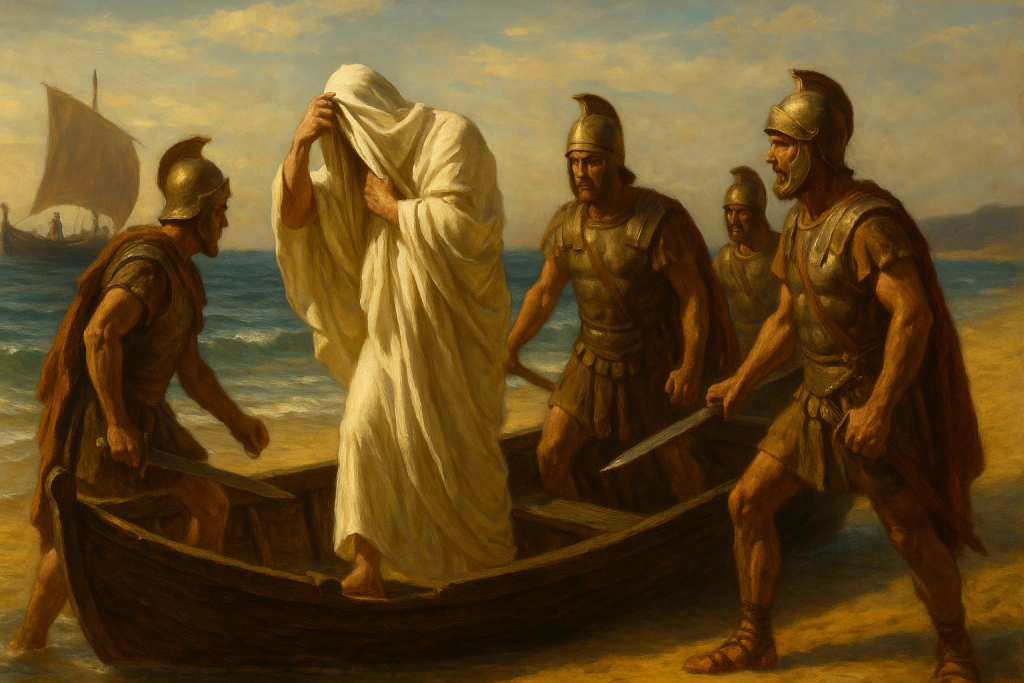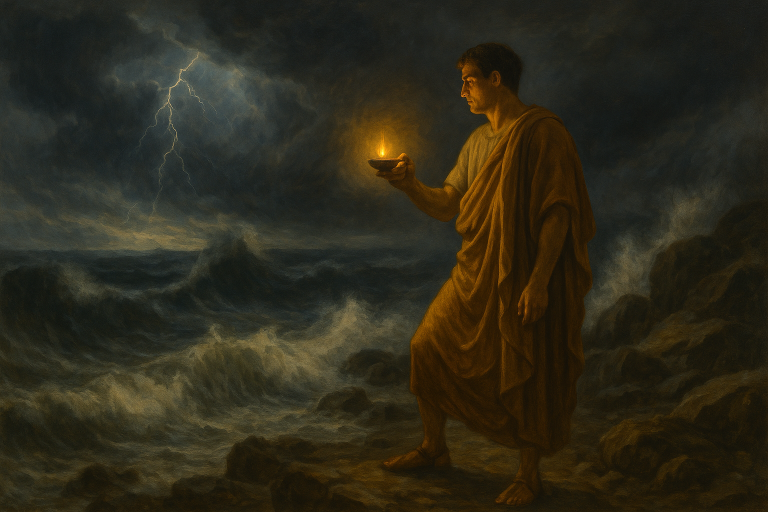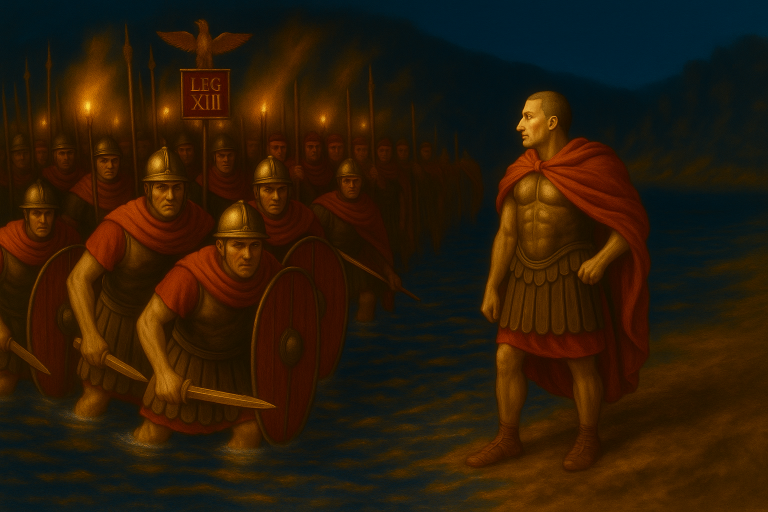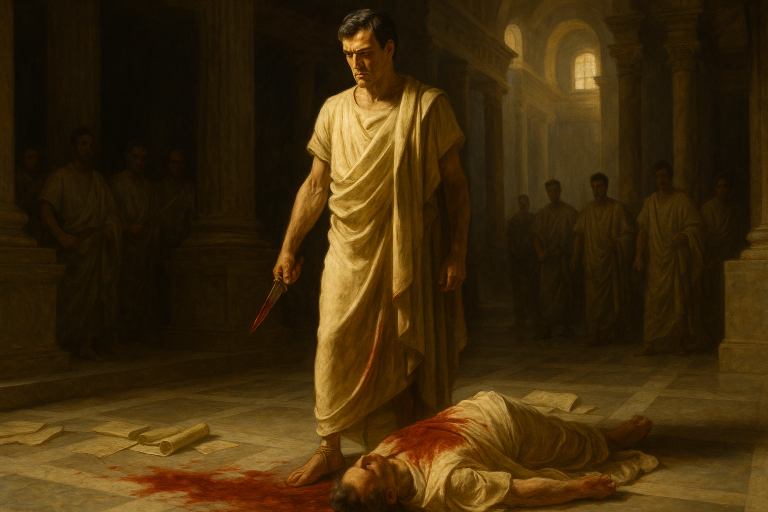Pompey the Great · How Rome’s Greatest General Lost Everything

Egypt, September 28, 48 BCE
The ship anchored off Pelusium, Egypt. From the deck, Gnaeus Pompeius Magnus watched a small boat row out from shore. Egyptian officials aboard. They seemed welcoming. They called out greetings, invited him to come ashore and meet the young king.
Pompey’s wife Cornelia stood beside him, watching the boat approach. Something felt wrong. She begged him not to go. But where else could he go? Italy was lost. Greece was lost. Caesar controlled everything. Egypt owed him favors. The young Ptolemy’s father had been his client. This was refuge, or it was nothing.
Pompey climbed down into the boat. Left his guards behind. A handful of Egyptian officials and one Roman officer, Lucius Septimius, who had served under him years before. The boat turned and began rowing back to shore.
As it neared the beach, Pompey stood, preparing to disembark. Septimius stood behind him. The others rose as well, hands moving to their sides.
Pompey saw the movement. Understood instantly. He pulled his toga over his head, the Roman way of facing death with dignity. The swords came. He fell. His body slumped in the boat, then was dragged onto the beach. They cut off his head.
From the ship, Cornelia watched her husband murdered. The greatest general Rome had ever produced, killed on the order of a teenage king who thought Caesar would be grateful.
Three days later, when Caesar arrived in Egypt pursuing Pompey, they presented him with the head. Caesar reportedly wept. Whether from grief or theater, no one knows. But the tears didn’t change the fact. Pompey was dead. The civil war was over. And the republic died with him.
How did it come to this?
The Teenage Conqueror
Pompey was born in 106 BCE into wealth but not nobility. His father, Pompeius Strabo, was a competent general and thoroughly hated man. When Strabo died, young Pompey inherited money, connections, and a reputation for ruthless efficiency.
At twenty-three, during Sulla’s civil war, Pompey did something audacious and technically illegal. He raised a private army from his father’s veterans and client networks. Three legions, loyal to him personally, paid with his own money. Then he marched to join Sulla against the Marian faction.
Sulla, impressed by the young man’s initiative and success, gave him the cognomen Magnus. The Great. Pompey was twenty-four years old.
He earned the name through brutal competence. Sulla sent him to Sicily and Africa to crush remaining Marian resistance. Pompey did so with efficiency that bordered on massacre. When he returned to Rome, he demanded a triumph. Unprecedented. He held no magistracy. He was too young. He had no legal authority for the command he’d held.
Sulla granted it anyway. The rules were already bending for Pompey.
In 73 BCE, when the slave revolt under Spartacus terrorized Italy, Pompey saw opportunity. Marcus Licinius Crassus did the heavy fighting, cornered the slave army, defeated it. Pompey arrived as the campaign ended, mopped up stragglers fleeing north, and claimed credit for ending the war. It was his pattern: arrive late, take glory. It worked. He celebrated a second triumph at thirty-five.
But the pirate campaign of 67 BCE showed what Pompey could do when given real authority and real challenge. Pirates controlled the Mediterranean, strangling Rome’s grain supply, raiding coastal cities, making the sea impassable. The Senate, desperate, gave Pompey extraordinary command. Five hundred ships. One hundred twenty thousand troops. Unlimited authority over the entire Mediterranean and fifty miles inland.
He cleared the pirates in three months.
It was genuine military brilliance. Coordination across dozens of fleets. Strategic division of the sea into sectors. Overwhelming force applied simultaneously. And mercy to those who surrendered, offering them land and peaceful settlement. The Mediterranean, which had been ungovernable, became safe. Rome had never seen success like this.
Then came the eastern conquests. In 66 BCE, Pompey received command against Mithridates VI of Pontus, Rome’s longtime enemy in the east. He defeated him, drove him to suicide, and then kept going. He reorganized the entire eastern Mediterranean. Conquered Syria. Annexed Judea. Marched to the Caucasus. Created client kingdoms. Reshaped the map.
Wealth poured back to Rome. Not just conquest plunder, but systematic reorganization of eastern trade and taxation. Pompey’s settlement of the East would stand for generations, the foundation of Roman power in the region.
When he returned to Italy in 62 BCE, he was forty-four years old. He had conquered more territory than any Roman in history. He commanded absolute loyalty from his veterans. He possessed wealth beyond calculation. He was, without question, the most powerful man Rome had ever seen.
And that was his problem.
The Problem of Success
Everyone expected Pompey to march on Rome. The precedent was clear. Sulla had done it. Marius before him. When a general returned with a loyal army and grievances against the Senate, he used force. That was how the Late Republic worked.
Pompey dismissed his army. He entered Italy as a private citizen. He requested, politely, that the Senate ratify his eastern settlements and provide land for his veterans. Reasonable requests. He had earned them. He expected gratitude.
The Senate refused.
Not all of it, but enough. The conservative faction, led by Cato the Younger and the optimates, blocked him at every turn. They feared his power. They resented his success. They saw that ratifying his arrangements wholesale would acknowledge his personal authority over foreign policy. They refused to set that precedent.
Pompey was shocked. He had served Rome brilliantly. He had brought unprecedented wealth and territory. He had played by the rules, dismissed his army, came as a citizen. And the Senate spat in his face.
The problem was simple. Pompey was a brilliant general and a terrible politician. He could command armies, plan campaigns, coordinate logistics across thousands of miles. But he couldn’t navigate the Senate. He didn’t understand how to build coalitions, make deals, read the room. He expected others to recognize his greatness and defer to it. When they didn’t, he had no response.
Cato blocked him constantly, not from personal hatred but from principle. Cato saw that Pompey’s demands, however justified by his service, undermined the Senate’s authority. Give Pompey what he wanted, and you were admitting that military success trumped institutional process. Cato would not do that. So he filibustered, obstructed, and frustrated Pompey at every turn.
By 60 BCE, Pompey was isolated. His achievements were fading into the past. His veterans were angry about their promised land. And he had no political path forward.
Then Gaius Julius Caesar returned from Spain.
Caesar, ten years younger than Pompey, faced similar obstruction. He wanted a consulship and a military command. The Senate, seeing his ambition clearly, blocked him. But unlike Pompey, Caesar understood politics. He saw that three frustrated men could help each other.
Caesar, Pompey, and Crassus formed the First Triumvirate. It was not official. Not legal. Just three powerful men agreeing to coordinate their political actions and support each other’s goals. Caesar would become consul. He would push through Pompey’s legislation and land grants. Pompey would support Caesar’s command in Gaul. Crassus would get tax contracts in the East and political influence.
It worked. In 59 BCE, Caesar as consul forced through Pompey’s eastern settlements and veterans’ land, using mob violence and intimidation when necessary. Pompey got what he wanted. Caesar got his Gallic command. And Rome took another step toward its own destruction.
For the next decade, the balance shifted. Caesar conquered Gaul. Every year brought new victories, new wealth, new glory. His letters and dispatches kept his name fresh in Roman minds. His veterans became legendary. Meanwhile, Pompey stayed in Rome, managing politics, aging, his own achievements receding into memory.
In 53 BCE, Crassus tried to match their military glory. He invaded Parthia seeking easy conquest. Instead, he died at Carrhae, his army annihilated in Rome’s worst defeat in a generation. The Triumvirate became a duel. Rome was too small for both Pompey and Caesar.
Pompey’s wife Julia, Caesar’s daughter, had died in 54 BCE. That family tie had held personal affection between the two men. With her gone, only political calculation remained. And the calculation was turning against Pompey.
The Slide to War
The Senate made its choice. They feared Caesar more than Pompey. Caesar was younger, more ambitious, less concerned with tradition. Pompey was older now, respectably married to a woman from a conservative family, seemingly domesticated by age and status. The optimates saw him as the lesser threat. More than that, they saw him as their weapon against Caesar.
They offered Pompey what he’d always wanted: recognition from the Senate, defense of the republic, the role of constitutional protector. All he had to do was oppose Caesar.
Pompey accepted. After years of frustration with the Senate, he finally had their support. But it meant choosing sides against his former ally, his daughter’s husband, the man who’d helped him when the Senate wouldn’t.
By 50 BCE, Caesar’s Gallic command was ending. He had to give up his army and return to Rome to face prosecution from his enemies, or he had to defy the Senate and march on Rome. He offered compromises. Both generals could disarm simultaneously. Both could retain provinces. Various creative solutions to avoid war.
Pompey could have accepted. He could have shared power, avoided conflict, preserved the peace. But he was convinced Caesar would back down. And if Caesar didn’t back down, Pompey was convinced he would win easily. He underestimated Caesar catastrophically.
On January 10, 49 BCE, Caesar crossed the Rubicon River with one legion. Civil war began.
Pompey’s strategy was sound. Abandon Italy, retreat to Greece and the eastern provinces where his power base was strongest, gather his forces, control the seas, then return with overwhelming strength. It made military sense. But politically, it was disastrous. To ordinary Romans, it looked like fleeing. Like abandoning the city. Caesar occupied Italy almost unopposed while Pompey sailed east.
For a year, Pompey built his forces. He gathered legions from across the eastern provinces. He trained new recruits. He assembled the largest army Rome had fielded in a civil war. On paper, he had every advantage. More troops, more resources, command of the Mediterranean, secure supply lines.
But his troops lacked recent combat experience. Caesar’s veterans had spent a decade fighting in Gaul, hardened by constant warfare, loyal to Caesar personally. And Pompey was training an army while Caesar consolidated his control of the West.
In 48 BCE, Caesar crossed to Greece with a smaller force. He was outnumbered. He was cut off from his supplies in Italy. Pompey had him. The smart strategy was to avoid battle, let Caesar’s supplies run out, let his army starve or mutiny. Wait.
Pompey tried. He understood the military logic perfectly. But he wasn’t commanding his army alone. With him were senators, the men who’d fled Rome, the conservative optimates who’d made him their champion. And they didn’t understand military strategy. They just saw Pompey refusing to fight.
The whispers started. Why won’t he attack? Is Pompey trying to preserve his own power by prolonging the war? Is he afraid? They questioned his courage. They pressured him constantly. Fight. Finish it. End this.
Pompey resisted for months. But the political pressure became unbearable. On August 9, 48 BCE, against his better judgment, he agreed to give battle.
Pharsalus
The armies met at Pharsalus in Thessaly. Pompey had forty-five thousand infantry against Caesar’s twenty-two thousand. He had a significant cavalry advantage. He should have won.
His plan was solid. Use his cavalry superiority to sweep Caesar’s right flank, then attack from the rear while his infantry engaged from the front. It was a good plan. It was working initially. His cavalry charged. Caesar’s right flank looked vulnerable.
But Caesar had anticipated it. He’d positioned reserves specifically to counter the cavalry attack. When Pompey’s horsemen charged, Caesar’s veterans wheeled into an anti-cavalry formation, using their pila as spears, targeting the riders’ faces. Pompey’s cavalry, mostly aristocratic young men unused to infantry combat, broke and fled.
With the cavalry gone, Caesar’s troops rolled up Pompey’s left flank. The line collapsed. Pompey saw it happening. Saw his numerically superior army falling apart. Saw the battle lost.
He removed his general’s cloak, left the battlefield, and rode to his camp. His officers found him there, stunned, unable to process defeat. They urged him to rally the troops, to reorganize, to keep fighting. He couldn’t. Something had broken in him. The great general, who had never lost a major battle, couldn’t comprehend losing to Caesar.
He escaped by sea with a handful of companions. Fifteen thousand of his men lay dead on the field. The rest surrendered. Caesar won decisively, brilliantly, against greater numbers. And Pompey fled east, looking for refuge.
The irony was complete. Pompey lost because he abandoned his military judgment and listened to politicians who didn’t understand warfare. The very Senate that made him their champion destroyed him by forcing him to fight before he was ready.
The Egyptian Trap
Egypt seemed like a logical refuge. It was nominally independent but actually a Roman client state. Young King Ptolemy XIII was about fourteen years old, ruling with a council of advisors and locked in a power struggle with his older sister Cleopatra. Pompey had helped Ptolemy’s father gain the throne years before. Egypt owed him.
When Pompey’s ship arrived off Pelusium on September 28, 48 BCE, he sent a message requesting asylum. Ptolemy’s advisors debated.
The calculation was cold. Pompey was finished. Caesar would arrive soon, pursuing him. If Egypt hosted Pompey, they made an enemy of the victor. If they killed Pompey, they earned Caesar’s gratitude. The realpolitik was obvious. The losing side got no loyalty.
They sent a welcoming delegation. Among them was Lucius Septimius, a Roman officer who had served under Pompey years before. They rowed out to Pompey’s ship, smiling, gesturing welcome. They invited him to come ashore and meet the young king.
Cornelia begged him not to go. The scene felt wrong. The welcome too eager. But Pompey had nowhere else to turn. He climbed into the boat.
As the boat neared shore and Pompey stood to disembark, the attack came. Septimius and the others drew swords. Pompey pulled his toga over his head, facing death the Roman way, with dignity. They stabbed him multiple times. His body fell. They dragged him onto the beach and cut off his head.
From the ship, Cornelia watched. The greatest general of the age murdered in shallow water by men he’d once commanded.
They preserved Pompey’s head in cedar oil to present to Caesar. His body they left on the beach. Eventually a freedman who had served him built a small pyre and burned what remained.
Three days later, Caesar landed in Egypt. The Ptolemaic advisors presented him with Pompey’s head and signet ring, expecting gratitude. Instead, Caesar wept. The sources say he wept. Whether from genuine grief for a former friend and son-in-law, or from fury that Egypt had robbed him of the chance to show clemency, or from pure political theater, no one could say.
But the message was clear. Pompey had been Caesar’s to defeat, Caesar’s to pardon or punish. Egypt had overstepped. The advisors who thought they were currying favor had instead made an enemy.
Pompey’s defeat at Pharsalus and death in Egypt marked the end of the Senate-controlled republic. He had been their last military champion, the last general with the strength to oppose Caesar. Not that Pompey himself was a defender of republican institutions. He’d bent the rules constantly, held extraordinary commands, built personal power outside normal channels. But he was the old guard. He played by older rules, expected traditional respect, wanted the Senate’s approval.
Caesar represented something different. A new model where military success trumped institutional legitimacy completely. Where personal armies were stronger than any political authority. Where the bold seized what they wanted rather than waiting to be granted it.
Pompey’s entire career showed the pattern that would destroy Rome. Young man raises private army. Achieves extraordinary military success. Senate can’t control him but tries to use him. Eventually he turns on the Senate, or they turn on him. The system couldn’t contain its own successful generals.
Sulla had done it. Pompey followed. Caesar perfected it. Eventually Augustus would make it permanent. The republic couldn’t survive because military competence made men too powerful, and the Senate had no mechanism to restrain them except other generals. It was civil war or dictatorship. Those were the only choices left.
Pompey’s personal tragedy was that he was caught in between. He was genuinely brilliant militarily. The pirate campaign showed strategic genius. The eastern conquests were organizational masterpieces. But that very competence made him politically dangerous. And his political incompetence made him vulnerable.
He wanted respect more than power. He disbanded his army expecting gratitude, got obstruction. He joined Caesar expecting partnership, got rivalry. He fought Caesar expecting victory, got defeat. He fled to Egypt expecting refuge, got betrayal. At every turn, his expectations failed him.
Caesar understood power. Pompey understood glory. They weren’t the same thing. And when they collided, power won.
In Dante’s Paradiso, Pompey is barely mentioned. In the histories, he’s overshadowed completely by Caesar. The man who conquered more than Alexander, who reorganized the East, who cleared the Mediterranean of pirates in three months, is reduced to a footnote. “Caesar’s rival who lost.” “The guy who got killed in Egypt.”
His achievements were real. His military genius was genuine. But his ending erased them. The greatest general Rome had produced until Caesar became memorable mainly for being defeated by him.
The Undignified End
September 28, 48 BCE. A small boat. A beach in Egypt. The greatest general of his age stabbed by lesser men while his wife watched from the ship. His head severed for a teenage king’s political calculation.
Pompey pulled his toga over his head before the swords came. Roman dignity in death, even when dignity had failed him in life. He had conquered the Mediterranean, defeated armies, earned the name Magnus at twenty-four. And he died on a foreign beach because he trusted in old loyalties that no longer existed.
Three days later Caesar arrived and wept. Whether from grief or theater doesn’t matter. The tears weren’t for a friend. They were for what Pompey represented. The last man who might have stopped Caesar through legitimate military force. The last defender of a system that was already dead.
A freedman who’d served Pompey found his body on the beach. Built a small funeral pyre from driftwood. Burned what remained. It was the only funeral Rome’s greatest general received.
Pompey wanted to be remembered as Magnus, the Great, the conqueror, the man who reshaped the world. History remembers him as the general who lost to Caesar. As the man who got outmaneuvered politically. As the corpse on an Egyptian beach.
That’s the weight of defeat. Not just losing the war, but losing the story. Pompey conquered more than Caesar in raw territory. He achieved military success earlier and more spectacularly. But Caesar won the civil war. And winners write the history. So Pompey, who should have been Rome’s Alexander, became merely the obstacle Caesar overcame on his way to supreme power.
The final cruelty was that his death accomplished nothing. Caesar went on to dominate Rome. The republic died anyway. Pompey’s murder was pointless, a teenage king’s miscalculation. He died for nothing, defeated for nothing, betrayed for nothing.
From Magnus to footnote. From the greatest to the forgotten. That was Pompey’s arc. And the beach in Egypt, where he fell in shallow water while his wife watched, became the symbol of how quickly glory turns to ash when power moves on.






